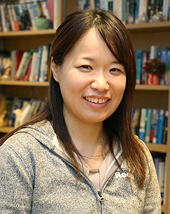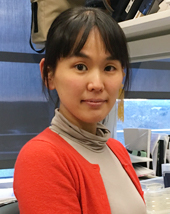Sechi Kato Program for RIKEN Hakubi Fellows
Description of program
In the Sechi Kato Program, RIKEN offers junior PI positions for independent research by exceptionally talented female researchers. The program, established in 2018, encourages active exchange between the fellows, and seeks to develop the next generation of leading researchers with a global outlook.
Who was Sechi Kato? – Sechi Kato (1893-1989) is a pioneering female scientist who developed spectrometric analysis of organic materials in Japan, and the first female Chief Scientist of RIKEN.
Features
Research fields
All areas of the natural sciences, including the mathematical sciences; research in boundary areas with the humanities and social sciences. Research topics with the potential for high impact scientifically or socially, including unexplored areas, and research on issues humanity currently faces, are welcome.
Qualifications
Female researchers. We seek the best people from a wide range of candidates; doctoral degrees are not a prerequisite.
Term
Maximum term of 7 years
Individuals taking prenatal, postnatal or childcare leave may extend their terms commensurate to the period they take for their leave, as provided in RIKEN regulations.
Research budget
10 to 40 million JPY per year, depending on research plan
(RIKEN’s facilities and equipment are available for use)
Remuneration
- Salary: 910,000 JPY per month, based on an annual salary (social security and tax are deducted from salary)
- Commuting expenses: Actual amount is paid up to maximum of 55,000 JPY per month
- Housing allowance: Half of monthly rent up to a maximum of 40,000 JPY per month for single units and 60,000 JPY per month for family units
- Relocation allowance: Available (based on RIKEN regulations)
- Other: Membership in the Science and Technology Health Insurance Society and the Science and Technology Welfare Pension Fund
Location of research team
Teams may be located on RIKEN’s Wako Campus, and other RIKEN campuses when necessary
Networking
- Active exchange encouraged between fellows
- Regular meetings with RIKEN president
FY2023 calls for proposals
Sechi Kato Program for Female RIKEN Hakubi Fellows (Eng.)
RIKEN Hakubi team leaders (Sechi Kato Program)
Erika Kawakami

Name of laboratory
RIKEN Cluster for Pioneering Research, Floating-Electron-Based Quantum Information RIKEN Hakubi Research Team
RIKEN Center for Quantum Computing, Floating-Electron-Based Quantum Information RIKEN Hakubi Research Team
Research topic
Quantum computation and quantum simulation using electrons on helium
Self-introduction
I have been fascinated by how physics describes the world since I was a high school student. There are some laws of physics that appear to be inconsistent with how we make sense of the universe in our daily life, but do, in fact, explain the world amazingly well. In quantum mechanics, an object can possess a superposition of two states and states change due to measurement. Whenever I encounter experimental results that can be explained by nothing but this weird aspect of quantum mechanics, it always reminds me of how unreliable my sense of the universe is and how important it is to think and act scientifically. I would like to create new technology that can enrich our society by making use of this weird aspect of quantum mechanics. That is why I am working towards the realization of a quantum computer. (Starting date: September 1, 2020)
Related link
Floating-Electron-Based Quantum Information RIKEN Hakubi Research Team webpage
Asuka Takeishi

Name of laboratory
RIKEN Cluster for Pioneering Research, Neural Circuit of Multisensory Integration RIKEN Hakubi Research Team
RIKEN Center for Brain Science Neural Circuit of Multisensory Integration RIKEN Hakubi Research Team
Research topic
Neural and molecular bases of multi-stimuli processing
Self-introduction
I am interested in how animals make behavioral decisions. Animals are exposed to continuously changing environmental stimuli, such as temperature, odor, light and sound. We sense and integrate these environmental cues in the nervous system in order to choose appropriate behavioral responses. I am studying the neural and molecular mechanisms of thermotaxis using C. elegans and its relatively simple nervous system. At RIKEN, I will investigate the mechanism of multi-sensory integration in the nervous system by analyzing behavior strategies and neural circuits of C. elegans that are exposed to multiple stimuli. In addition to this biological approach, I’d like to incorporate mathematical and computational models to reveal the evolutionally-conserved fundamental mechanism of behavioral decision. (Starting date: July 1, 2019)
Related link
Takeishi Lab webpage (RIKEN Center for Brain Science)
Contact
Research Personnel Affairs Section
Human Resources Division, RIKEN
2-1 Hirosawa, Wako, Saitama 351-0198
Email: hakubi [at] riken.jp
Fax: +81-(0)48-463-3687
